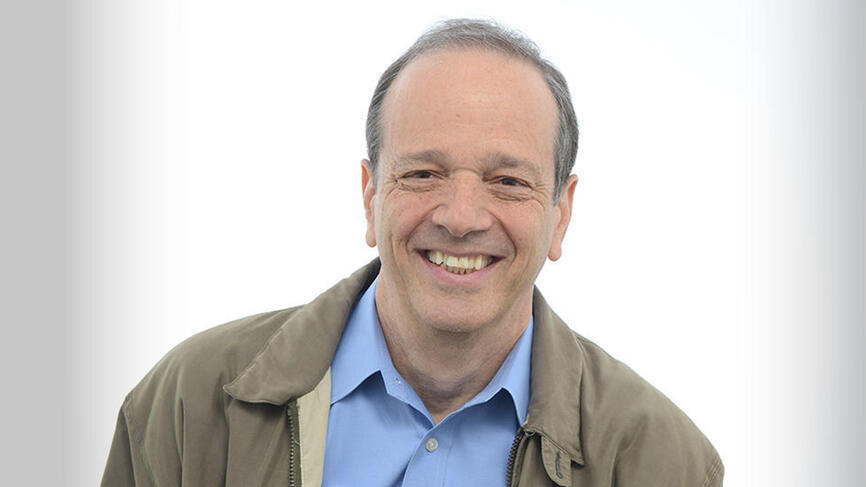As David Lindauer Retires, the Calderwood Program He Created Continues to Grow

As a graduate student in the 1970s, David Lindauer, Stanford Calderwood Professor of Economics at Wellesley, was once invited to a lunch with Nobel Prize-winning economist Robert Solow. One of Solow’s comments stayed with him: “If you really understand your economics, you should be able to explain it to a fourth grader.” That concept inspired Lindauer’s work with the Calderwood Seminars in Public Writing program he developed at the College and expanded beyond its borders.
Lindauer, who presented Wellesley’s annual Distinguished Faculty Lecture on May 3, titled “What the Calderwood Seminars Teach Us about Our Students and Ourselves,” will retire at the end of the 2022 academic year after 41 1/2 years at the College. The impact he has had during his career is visible in many ways, but perhaps nowhere more clearly than through his work with the Calderwood seminars.

In the seminars, students learn to write for a public audience about topics related to their majors. Most are juniors or seniors, and enrollment is capped at 12. The students work in pairs, one serving as writer and one as editor, and they alternate roles throughout the semester. Assignments might include writing a profile of an expert in a specific field, a book review, or an article about recently published research, all of which are intended for readers of a major newspaper or other widely read media outlet.
Lindauer first taught ECON 335: Economic Journalism, the course that would become the starting point for the Calderwood seminars, in 1984. “I wanted to create a course where students were compelled by its structure to explain their knowledge to somebody who didn’t have the same specialized training that they did,” he said. “I thought having to communicate using public writing would be a mechanism for gaining a deeper understanding of what they knew.”
When the College reduced the full-time faculty teaching load from five courses to four in 1989, some courses had to be cut; Economic Journalism was put on the back burner. But an opportunity to breathe new life into it came 12 years later when Stanford Calderwood, a businessman and philanthropist who had been a visiting lecturer in the Wellesley economics department, wanted to endow a chair at the College. His offer came with a requirement: The professor who received it would need to teach a course in business writing. Economic Journalism, a close-enough substitute, was back.
The course served as the blueprint for the public writing program. Since 2013, when the first Calderwood seminars became available, the program has grown to include 27 courses offered at Wellesley. Lindauer has also expanded the program at institutions around the country, including Bard College, Georgetown University, Smith College, and the University of Washington. To date, 126 faculty members have launched a Calderwood seminar, and more than 2,200 students have taken one.
As a colleague put it, maybe what the liberal arts owe democratic societies is the ability for citizens, especially our educated citizens, to be able to communicate more clearly, more effectively, with reasoned arguments.
David Lindauer, Stanford Calderwood Professor of Economics at Wellesley
Many students enter the classes having only written for an audience of one—their professor. Tracy Gleason, psychology professor and faculty director of Wellesley’s Calderwood program, encourages them to shift their focus. “I often talk with them about my late grandmother, who didn’t have the opportunity to go to college,” she said. “A very smart woman, just uneducated. Read the newspaper cover to cover every day. She’s who you’re writing for.”
“What do you want to say to her?” she asks them.
“Writing for a public audience kind of forced me to revisit the assumptions that I was making about my readers,” said Sydney Pierce ’22, a psychology major who took PSYC 343: Psychology in the Public Interest. Though they didn’t think of themself as an academic writer, after looking at their work through the Calderwood lens, they realized they were using language specific to psychology, like acronyms. Writing with a public audience in mind is good, Pierce said, not only for reasons of accessibility, “but also your writing is going to be so much more engaging, if you move away from this kind of academic jargon.”
“David Lindauer developed an amazing pedagogy for Calderwood seminars,” wrote Dan Sichel, professor of economics, who took over the Economic Journalism course four years ago. “The course puts students, their work, and feedback from students on each other’s work front and center. As the prof, I’m just the conductor who coordinates the symphony performed by students in the class.”
Miracle Taanarwo ’23 said the editing process was a highlight of AFR 330: Black Diaspora, Political Experiences in Pandemics, taught this spring by Chipo Dendere, assistant professor of Africana studies. That feedback “helps you see if people understand what you’re saying, or relate to the experiences you’re talking about,” she said. A student editor would read her paper and say, “I understand this, I don’t understand that. I think you’ve made a generalization here.” “It really helped me think about my audience,” she said.
Writing for a public audience kind of forced me to revisit the assumptions that I was making about my readers.
Sydney Pierce ’22
Dendere said she loved the experience of teaching a Calderwood seminar for the first time this semester and found that it challenged her, because knowing how to write is not the same as teaching others how to write. She was excited that the students came in wanting to learn: “Their drive, as was my drive, was, how do we repackage what people are learning about Africa, Africans, and Black diaspora for the public audience?”
Lindauer said he sees public writing as a way for students not just to understand a topic in depth, but also for them to communicate that understanding clearly to a wide audience, a much-needed skill in the current age of misinformation. “As a colleague put it, maybe what the liberal arts owe democratic societies is the ability for citizens, especially our educated citizens, to be able to communicate more clearly, more effectively, with reasoned arguments,” he said.
“I honestly think that it should be a requirement for every student,” said Leah Black ’23, who, like Pierce, took Psychology in the Public Interest. “We started off our Wellesley experience with a first-year writing course, so taking this class feels like we have come full circle as students. It’s the perfect end-of-college counterpart. OK, now, you’ve learned all these things. How are you going to convey them in the future?”
What does Lindauer’s post-Wellesley future look like? He and his wife plan to visit their three daughters and their families, who live in Arkansas, California, and Alaska, to catch up on all they missed due to the pandemic. And while he’s retiring from Wellesley College, he said, he’s not retiring from working: “I’m hoping to be involved with the continued expansion of the Calderwood seminar program to other campuses.”
Lindauer is grateful for the career he’s had at Wellesley and especially the support the College has given him over the years. “I’ve had the same employer, but I’ve had many different careers in four decades,” he said. “I often tell students that Wellesley is a lifetime membership.” He expects that to be true for him as well.



